Encouragement during COVID-19
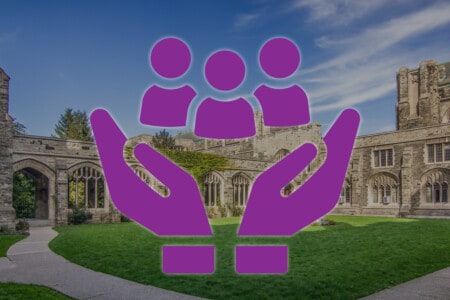
This page is for community encouragement and connection during COVID-19. For official announcements about COVID-19’s impact on the Knox College community, visit knox.utoronto.ca/coronavirus.
May 20, 2020
Seeking life in death: Living out the challenge of Easter in a COVID-19 world
By Dr. Esther E. Acolatse, Associate Professor of Pastoral Theology and Intercultural Studies at Knox College

Holy Week has always felt like a roller coaster ride for me, a mix of extremes. But God is present – from Palm Sunday’s loud hosannas, through Gethsemane’s anguished prayer, to a gory cross and the dead silence of Saturday, all the way to a jaw-dropping Sunday. We know the story well, but in this COVID-19 world, I bet we understood it with new dimensions this year.
This Palm Sunday, with my own palm branches at half-mast, I cried a louder Hosanna than I had ever done. I truly had a reason to say: “Save us in the Highest!” – and pictured not just the crowds of joyful people, but also the many whose lungs didn’t allow a whispered Hosanna.
Even though Jesus knew what was about to happen – and perhaps because of the coming pain – he let the crowd have a big party. He understood the importance of gorging on joy, so that you are shored up for the ugly dark moments. Friends, there is probably more pain ahead, so take a cue from the Man of Sorrows, and don’t stint on the beautiful and joyful moments. Find ways to ring those joy bells for yourself and your communities.
Then in dark Gethsemane, Jesus gave us an example of how to face our deepest fears: kneel aground, cry for change in circumstances to the changeless one, and trust his will. Don’t look at the darkness; turn to the light. Fear is a lie peddler. The cure is in tears and words; heart-wrenching tears and loud protestations, not mute resignation that leads to cynicism. When our eyes are washed with tears, we can see more clearly what is true.
The Friday that we call “Good” and the Saturday we call “Holy” take the prize for confusion, despair, and the seeming absence of God. If we are honest, even we who have received great benefit from the sacrifice on the cross do not really understand it. Thankfully, we don’t have to completely comprehend it to invite people to the hope it signals.
This Good Friday, in light of COVID-19, I paid more attention to the silences and pathos in the story and in our world. Our airwaves were filled with news of people dying in hospitals who were, because of the disease, denied the embrace of loved ones. We know that Mary was unable to hold her child as he died. In the same way, taking a page from Israel’s prophets who spoke of Yahweh in deeply anthropomorphic terms, I wondered how many angels and archangels had to help prevent the Father from reaching out to hold his Son. God’s pain and seeming helplessness on that day mingle with the pain of all who are lamenting empty arms this season.
When Easter morning dawned this year, all over the world it was not “business as usual”; instead, empty churches mimicked the empty tomb. There were no gaily decorated altars and nicely dressed worshippers. But perhaps this was the most “real” Easter of our time. Just like at that first Easter, there were no full church buildings, and only small handfuls of believers gathered. The Church now gets a fresh start.
This Easter, with raw pain and confusion over this devastating pandemic, we were specially invited to peer into that place that once entombed death – and to envision a womb that will bring life. We speak resurrection joy and hope into a world filled with confusion, doubt, and pain.
Now we live out the challenge of Easter, following God through the valley of the shadow of death. Even from behind the closed doors of our partial lockdown, we can do acts of goodness that spell hope. And so let’s bring on the celebrations, cry out in supplication to God, and wait for the glory to come.
May 12, 2020
Encouragement from the Knox College Choir — singing “In His Love”:
May 1, 2020
God and Gardening — reflection by Knox MPS student Antonio Siracusa
 In experiencing moments of increasing confusion, uncertainty, and fearfulness about COVID-19 in Canada, I decided to continue burying myself in gardening, to help feel more productive and less pensive. One of the tasks I completed was transplanting a Rose of Sharon from a side flower garden to the front yard. This Rose of Sharon plant had been in the same corner for years, increasingly weaving itself through the fence.
In experiencing moments of increasing confusion, uncertainty, and fearfulness about COVID-19 in Canada, I decided to continue burying myself in gardening, to help feel more productive and less pensive. One of the tasks I completed was transplanting a Rose of Sharon from a side flower garden to the front yard. This Rose of Sharon plant had been in the same corner for years, increasingly weaving itself through the fence.
After soaking the hard dirt with water, I tried to uproot the Rose of Sharon with careful digging — but the roots were well-established. I had to get on my knees and use my hands to carefully and lovingly manipulate its roots. As my hands followed the length of the roots in the dark, cold mud, I suddenly felt scared for this plant. I was especially conscious of not wanting to break any of its roots.
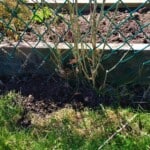
I so wanted this Rose of Sharon to survive. These plants bring such beauty to the world after it has slumbered during the seemingly empty winter season. A saying from Martin Luther emerged from corners of my mind, and my eyes almost started to tear up as it took me by surprise: “If I knew tomorrow that the world would end, I would still plant an apple tree today.”
I stopped for a few seconds, rested on my heels, and tried to digest the connection of my physical work with Luther’s insight, allowing myself to feel the profound meaning this quote had for me at this very moment. I then returned to freeing this little but strongly rooted plant. My fingers kept following this Rose of Sharon’s roots, pushing aside more and more mud in an effort to try to uncover how far its roots went. Finally I reached the ends of its roots — but the plant was not yet free. I then had to carefully untangle its few branches from the fence, which took some time.
I placed the now cherished Rose of Sharon in its prepared new home in the front yard. As I filled the dirt around it, I smiled, knowing that I had helped this little guy to live and breathe more easily. I had faith that its roots would dig deeper than before, and that with its freedom established, it would grow every year and feel the warmth, love, and hope of our bright shining sun.
A few days later, I once again knelt down by this Rose of Sharon in its new location, and I read the following:
God brings us to faith in many ways.
We may have trusted in God from childhood;
or our faith may have come later in life.
Faith may come suddenly
or only after a struggle to believe.
Whatever the spiritual journey we have traveled,
God honours our faith, great or small.
(Living Faith: A Statement of Christian Belief, 6.1.2)
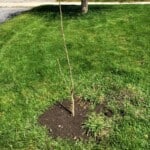 This Rose of Sharon had moved from a place of stunted growth, confinement, and restriction to a place of freedom, life, and hope. It reminded me how, with time and distance from our own fear-filled situations, as we pay attention to the gentle but persistent nudges of the Holy Spirit, we can hopefully look back and see how God used those strange dark times to make us stronger and to help prepare us for what’s around the corner.
This Rose of Sharon had moved from a place of stunted growth, confinement, and restriction to a place of freedom, life, and hope. It reminded me how, with time and distance from our own fear-filled situations, as we pay attention to the gentle but persistent nudges of the Holy Spirit, we can hopefully look back and see how God used those strange dark times to make us stronger and to help prepare us for what’s around the corner.
Regardless of what comes from this ongoing COVID-19 pandemic, I believe it important to continue to practice hope in the knowledge that God is in charge and has a plan. Through the promises laid out by Our Father’s only Son, Jesus Christ, the promise of believing in Him prepares us for what is to come, which will not be the same as it was before – but we trust can be somehow better.
April 27, 2020
April 23, 2020
From Dr. Stuart Macdonald, Acting Principal
Greetings to all in the Knox community.
Term is over. That’s quite an accomplishment – for students in particular, but also for faculty and staff. We finished what we’d begun, even though it was along a much different path than we’d imagined. Congratulations, all. And now, the spring semester and then summer, and then the fall and next year.
There is, and will be, a great deal of uncertainty. There is also the assurance – God is with us.
This is a song Wendell Kimbrough wrote based on Revelation 21. It seems fitting for this Easter season, and particularly for now.
April 15, 2020
From Dr. John Vissers, Principal (currently on research leave)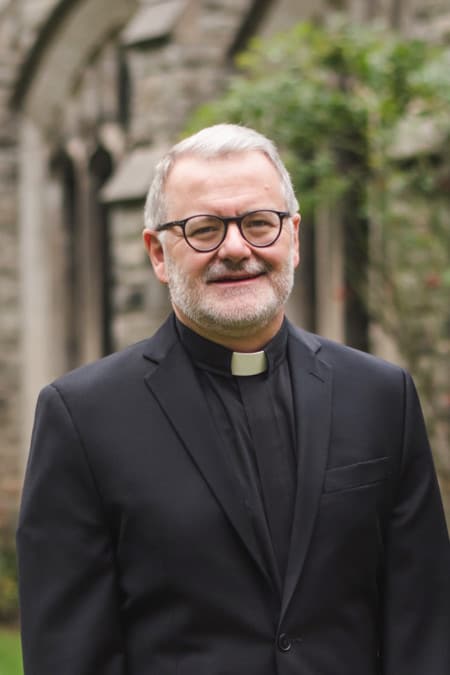
The Friendship of Jesus in a Time of Pandemic
Since January, I have been on a scheduled sabbatical leave, researching and writing a book on spiritual theology in the Reformed tradition, focused on the theme of friendship with Jesus. I confess that I am one of the privileged few whose daily routine has not been upended by Covid-19. Self-isolation and physical distance are not difficult for an introvert and academic to practice in the comfort, familiarity, and security of a home study. The discipline and distraction of doing daily theological work during this time is a gift; and I am grateful.
Knox College has been able to pivot and carry on the good work of theological education during this crisis. I am so very grateful to my colleague Professor Stuart Macdonald for stepping into the gap as Acting Principal, and to the faculty, staff, students, residents, board members, alumni, and donors who have found ways to see that the College’s mission moves ahead.
I have been thinking a lot about what it means to do theology as a follower of Jesus during a pandemic. Like you, I expect, my thoughts and emotions have been all over the place: anxious worry for family and friends; sadness for the sick and the dying and those left behind to grieve from a distance; guilt for not being able to do more; and gratitude for the courage and service of front-line workers.
In early March, when we all began to realize that a highly communicable virus had reached Canada and was growing exponentially in our midst, my reading and research intersected with my anxious thoughts. In the course of some work on seventeenth century Protestant spirituality, I came upon a relatively unknown Puritan preacher and author, James Janeway (c.1636-1674), whose book, Heaven on Earth: Jesus, the Best Friend in the Worst Time, contains sermons preached in London in the 1660s.
The book is not particularly well-known, probably for good reason. Janeway’s method is often tedious and pedantic, and like many Puritan preachers, he sometimes comes across as stuffy and censorious. But here’s the thing: Janeway preached these sermons on the friendship of Jesus in the aftermath of the 1665 plague in London that killed thousands of people and the great fire that destroyed much of the city in 1666. In addition, Janeway suffered from anxiety and depression, contracted tuberculosis, and died at age 37.
Many of the same tough questions that trouble us now troubled Janeway and his congregation. When will this pandemic end? Will we be able to rebuild from the ashes? What will happen if I get sick and die? Where is God in all this?
In the face of this immense social suffering, and his own personal anguish, Janeway did not do what we are often tempted to do. He did not try to explain the providence of God and the mystery of evil. Rather, he simply said what he believed to be true. God was with them. Friends are faithful. And Jesus is the friend “who stands with us in all sorrows, who buoys up the soul under the mightiest waves of fear, when wars ravage, when the pestilence rages, when the nations are distressed and perplexed.”
Now, Janeway knew full well that when the New Testament speaks of Jesus as friend it is not offering up pious platitudes. Jesus first called his followers friends in John 15, shortly before he died. “No one has greater love than this, to lay down one’s life for one’s friends.” On the cross, Jesus stepped into the darkness of death and the chaos of hell, for us, and with us. “Heaven on earth,” for Janeway, is not some utopian ideal. It is to know the friendship of God’s crucified Messiah, risen and ascended, in all the trials and tribulations of life.
Perhaps it sounds trite to say the world needs friendship right now. It is nonetheless true. I have been heartened to experience a new sense of community and neighbourliness when I go for my daily walks (practicing physical distancing, of course). It’s been encouraging to see the ways in which many are keeping in touch with friends and family through zoom, skype, facetime, email, texts, and telephone calls. I am grateful for pastors and congregations who have stepped up to provide opportunities for worship, prayer, and Bible study online. And we are all learning during this pandemic that for most of us friendship means staying home to protect others.
But beyond all that, it’s been good to see many people of faith practice what theologian Jürgen Moltmann calls open friendship, friendship that is not limited to those who are like us, or who believe what we believe. The friends of Jesus see to it that people get food and clothing and a safe place to shelter. The friends of Jesus do not turn away from the suffering of the world.
We don’t know what the future holds. It’s hard not to worry. A friend once said, “Do not worry about tomorrow, for tomorrow will bring worries of its own. Today’s trouble is enough for today.” Thankfully, the same friend also said, “And remember, I am with you always, to the end of the age.” That’s the hope of Easter, the promise of everlasting friendship with Jesus.
April 9, 2020
From Dr. Stuart Macdonald, Acting Principal
To all in our community,
Exam week is always a busy time. When it is in Holy Week, as it is this year, it is even busier. When we are all dealing with the challenges that COVID-19 has brought to our families, our work, our studies – well, it can be completely chaotic.
Today on Maundy Thursday I would like to invite all of us to just pause for five or ten minutes to offer prayer for our world and this situation. My suggestion is that you simply take a few minutes, be quiet, and offer prayers for
- government leaders
- health care workers
- other support workers (for example, truck drivers, and those working in stores)
- those who are ill, dying, and their families
- those suffering’s financial or other difficulties
- Knox College – student, faculty, staff residents
- our broader world
- a time of silence for other prayers.
For me – I will be taking that time at 5:00pm. You may choose to set aside time then as well. For others, I know that will be impossible – but whenever you can, just take a moment and remember the needs of our world this day.
We will be staying connected – even after the term. There are some thoughts, but at the moment, they are just thoughts. Do keep checking your email and this webpage.
May you experience God’s comfort and peace at this time; and may we all grow in our understanding of Jesus passion, and the glory of the resurrection.
Stuart
April 2, 2020
Another song of hope played by Acting Principal Stuart Macdonald: “He’s on our side” (based on Psalm 124), by Wendell Kimbrough and Jason Pears.
March 26, 2020
From Dr. Stuart Macdonald, Acting Principal
March 23, 2020
Join us for Knox College Community Worship tomorrow (March 24) at 4:15pm via Zoom, hosted by Sarah Travis, Minister of the Chapel Check your email for the updated link for worship.
March 20, 2020
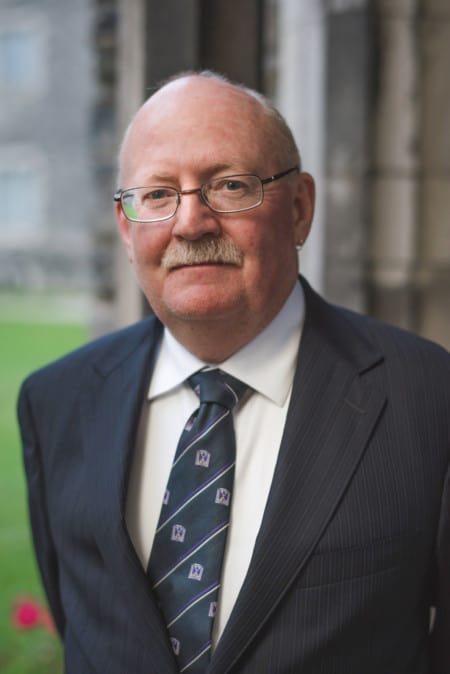 From Dr. Stuart Macdonald, Acting Principal
From Dr. Stuart Macdonald, Acting Principal
It’s been quite a week. It feels like a year. Every time I’ve taken a deep breath, it seems like something else has happened. But, it’s now its truly time for a deep breath.
I want to thank everyone for their hard work, cooperation, and willingness to adapt. Classes were held this week. Our residence continued to function. We did the best we could to move into social distancing. I am proud of everyone in the Knox Community.
I don’t know what next week will bring, or the week after. Do keep checking email, and our website.
We’ve made some of the difficult decisions. It’s now time to think about how we support each other.
We are beginning to put a few things in place. We’ve established this new webpage in order to encourage and care for one another. We are planning a worship service – online – next week (more information to follow in the days ahead).
We continue to pray for each other – and I would ask you to continue to do that. We have members of our community who are doing child care while trying to study, who have themselves or their partners had their income affected, are working in situations (hospitals, health care, or even their daily commute) where they may be more likely to be in contact with the virus, and we have people far from home. We are particularly aware that one of our faculty, Dr. Nam Soon Song, is in Korea and not able to come back.
Please pray for all of these needs, and those others you can think of. Remember those affected in Italy, Iran, throughout the world, and here in Canada. Remember to pray. And remember to reach out. Have coffee together – okay, it might be virtually via technology, but remember to do it. Email a friend or classmate.
Let’s support each other. God is our refuge and strength. And we can support each other as we remember this. God bless.
March 20, 2020
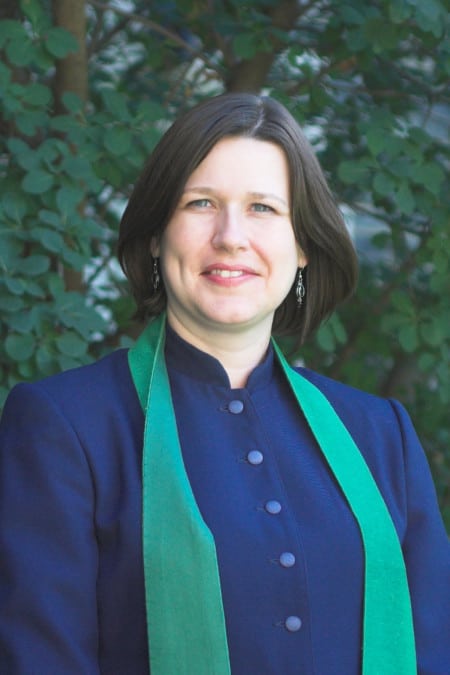 Post by the Rev. Dr. Sarah Travis, Minister of the Chapel, Knox College
Post by the Rev. Dr. Sarah Travis, Minister of the Chapel, Knox College
Before I went to bed on Thursday, March 12, I was looking at Facebook. One of my friends posted “What a year today has been!” How true that felt! On that Thursday, all the major sports leagues suspended their seasons, the schools were closed for two weeks, and the Prime minister’s wife was being tested for COVID-19. People hoarded toilet paper. We all wondered what on earth was going on – it seemed like the world turned upside down in a period of 24 hours. So yes, it felt more like a year. What has happened since is equally unimaginable. The University is closed, our classes have gone online, people are still hoarding toilet paper, and Canada has shut down its borders.
For some, this is a terrifying time. Although the threat has not come near to many of us yet, it is affecting all of us. We are locked into our homes, unable to go about our daily business in any usual way. Our social support structures are stretched, and many of us are having a hard time just getting through the day.
From a biblical perspective, the Israelites knew all about threat. In Exodus 17:1-7, they have been making their way through the wilderness, approaching the end of their journey toward the promised land. They have been travelling for decades – wandering with some purpose, but frequently losing sight of their destination. They grumble a lot about their conditions – but who can blame them? I’ve heard a lot of grumbling in the past few days (most of it coming from me).
The text tells us that they camped at Rephadim, but there was no water.
The Israelites are thirsty. This thirst was not a mere tickle, it was a life threatening condition. Think of what it meant for whole communities to be travelling in the heat of the day – with children and livestock and all their possessions. To be thirsty in the wilderness is to be on the edge of death. No wonder they are terrified, no wonder they take it out on Moses, their leader. They have become dependent on him to show them the way, and here they are in a hot and dry place with nothing to drink at all. They are in such a bad way that they wish they were back in Egypt. This tells us a lot – they preferred the certainty of slavery over the uncertainty of freedom. Their freedom wasn’t worth this kind of threatening thirst. At least when they were slaves they had water and food.
The people are so angry and so scared that they are ready to stone Moses – which would certainly have been a self-defeating move, but when people are terrified they do strange things. Moses turns to the only source available to him – he turns to God, asking “What shall I do with these people?”
The God of the Universe, at least in the book of Exodus, always has an answer.
God tells Moses to take a group of the elders with him, and use his staff to strike a rock, the same staff that parted the waters of the Nile – and water would come out of the rock so the people could drink, and the animals could drink. Their lives would be saved. God said he would be standing there in front of them. Moses did what he said, and at least in that moment, they were safe.
As I said, people act strangely in times of scarcity and terror. It’s interesting to me that the people cried out to Moses for help, instead of crying out to God. After all, it is only God who can provide for our needs. In times of trouble, we are invited to cry out to the one, holy God of the universe, who will be there standing in front of us.
We also need to cry out to God for help. Let us not make the same mistake that Israel did – they cried to Moses, not to God. Let us cry to God to keep all of us safe – our neighbours and our loved ones. But let us also cry to God to keep safe those we don’t know – the 844 million people without fresh drinking water, the millions of refugees, all those who are hungry and whose support systems are failing. Let us cry out to God with confidence that we will be heard, that God is standing right in front of us, waiting to bring forth water from the rock.
In the coming weeks, I invite you to try a new tradition. Every time we wash our hands, let us pray for those who don’t have enough. Let us pray for those who hunger and thirst. Let us pray for those who are ill or afraid of becoming ill. Let us pray to the God who listens to us, Who will bring forth new life, who has brought new life in Jesus Christ.
March 19, 2020
A SONG OF ENCOURAGEMENT from Stuart Macdonald, Knox College’s Acting Principal: “Last night, March 18, I decided after a trying day to pull out the guitar and play a song for the Knox community. I wanted to do a video as well, but that didn’t quite work. So, here is the live recorded version, done as a slide show. It’s my hope that this will be of some comfort, as we all adjust to the new realities, to not seeing each other, and the challenges of our times. As the song reminds us, God is always our refuge, even in times like these. God bless.” -Stuart
“I’ll not be shaken” — played by Stuart Macdonald; song by Wendell Kimbrough:
NOTE: Wendell Kimbrough is now hosting Sunday evening Psalms Concerts/singalongs, as he is able, at 7pm/6pmCST at www.wendellk.com/livestream
